
Queanbeyan is a city in the south-eastern region of New South Wales, Australia, located adjacent to the Australian Capital Territory in the Southern Tablelands region. Located on the Queanbeyan River, the city is the council seat of the Queanbeyan-Palerang Regional Council. At the 2021 census, the Queanbeyan part of the Canberra–Queanbeyan built-up area had a population of 37,511.
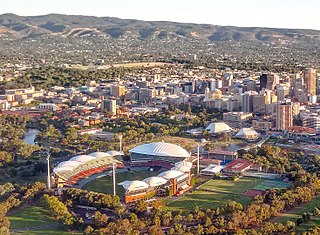
Adelaide Oval is a sports ground in Adelaide, South Australia, located in the parklands between the city centre and North Adelaide. The venue is predominantly used for cricket and Australian rules football, but has also played host to rugby league, rugby union, soccer, tennis among other sports as well as regularly being used to hold concerts. Austadiums.com described Adelaide Oval as being "one of the most picturesque Test cricket grounds in Australia, if not the world." After the completion of the ground's most recent redevelopment in 2014, sports journalist Gerard Whateley described the venue as being "the most perfect piece of modern architecture because it's a thoroughly contemporary stadium with all the character that it's had in the past."
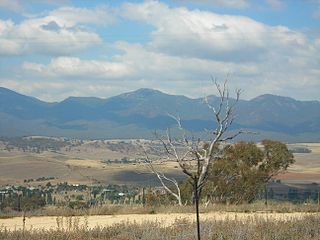
Michelago is a village in the Monaro region of New South Wales, Australia. The village is in the Snowy Monaro Regional Council local government area, 54 kilometres (34 mi) south of Canberra on the Monaro Highway. It was founded in the 1820s, on the main route from Sydney to the Snowy Mountains. At the 2016 census, Michelago had a population of 562.

Harry Hewitt, sometimes spelled "Hewit", "Ewart" or "Hewett", was an Indigenous Australian cricketer and Australian rules footballer. In 1889, Hewitt played for the Medindie Football Club, and so is believed to be the first Indigenous Australian to play in the South Australian Football Association (SAFA), known today as the South Australian National Football League (SANFL).
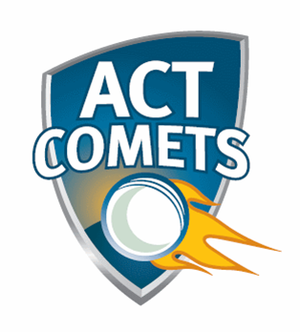
The ACT Comets are a cricket team that represent the Australian Capital Territory. The Comets are the premier team of the Cricket ACT who are affiliated with Cricket Australia.

Corio Oval was an Australian rules football ground, located in Geelong, Victoria, and used by the Geelong Football Club in the VFA and the VFL from 1878 to 1915, and 1917 to 1940. Sited in Eastern Park, the oval was served by trams from 1930 when the line was extended along Ryrie Street to the football ground.

The Ardmona Football Club is an Australian rules football club from the Goulburn Valley town of Ardmona, Victoria, Australia that plays in the Kyabram & District Football League.
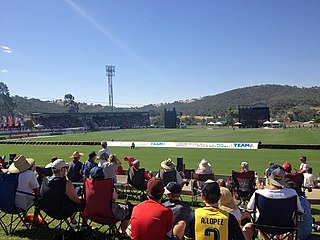
Lavington Sports Ground is a sports ground located in the suburb of Hamilton Valley near Lavington on the north-west fringe of the city of Albury, Australia. The oval is nestled in the side of a hill, with concrete terraces cut into the southern side of the oval below a grass embankment and the grandstand and changing rooms located on the north-west flank. The venue also incorporates a 4 table cricket wicket, a velodrome for track cycling and two netball courts. The Lavington Panthers Sports Club licensed club was formerly located next to the ground, across Hanna Street.

Australian rules football in New South Wales is the team sport as played and observed in the Australian state. It dates back to the colonial era in 1866 with organised competition being continuous since the 1880s. Today, in several regions of the state, it is moderately popular, including areas near the Victorian and South Australian borders such as the Riverina, Broken Hill, and South Coast. Elsewhere, and particularly in Sydney, Rugby league and Soccer are more popular. These areas form part of an Australian cultural divide described as the Barassi Line. To the east of the line it is known as "AFL" after the elite Australian Football League competition. AFL NSW/ACT is the governing body and includes the Australian Capital Territory.
The Canberra Region Rugby League competition is more commonly known as the Canberra Raiders Cup, covering the Australian Capital Territory and surrounding New South Wales towns Queanbeyan, Goulburn and Yass. The competition is run under the auspices of the Country Rugby League and players are eligible for selection in the Canberra Division of the CRL Tier 1 Divisional Championships. The Canberra district competition has an under 19s, reserve and first grade competitions.
This is an article that describes the history of Australian cricket from its known beginnings until the eve of the first-ever Test matches between Australia and England, which took place in the 1876–77 season.

The ANU Medical School (ANUMS) is a graduate medical school of the Australian National University, a public university located in Canberra, in the Australian Capital Territory. Established in November 2003 following accreditation by the Australian Medical Council (AMC), ANUMS commenced offering studies in the Bachelor of Medicine, Bachelor of Surgery program and, under the leadership of the Foundation Dean, Professor Paul Gatenby, the first cohort of students commenced in February 2004. In January 2014 the AMC approved the ANU Medical School changing its medical program to the award of the MChD program.

Patrick James S. "Paddy" Carew was an Australian rugby union national and state representative and a first-class cricketer and public servant. He was born in Pine Mountain in southern Queensland.
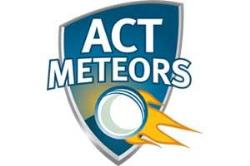
The Australian Capital Territory Women cricket team, also known as the Intravision ACT Meteors, is the women's representative cricket team for the Australian Capital Territory. They play most of their home games at Manuka Oval, Canberra and they also use Phillip Oval, Canberra. They compete in the Women's National Cricket League (WNCL), the premier 50-over women's cricket tournament in Australia. They previously played in the now-defunct Australian Women's Twenty20 Cup and Australian Women's Cricket Championships.
Country Cricket New South Wales is responsible for the development of cricket in regional New South Wales. It is under control of the governing body Cricket NSW.
Jonathon Robert Dean is an Australian former cricketer and current head coach of the ACT Meteors. He was a right-handed batsman.
The Goulburn Chronicle and Southern Advertiser was a weekly English language newspaper published in Goulburn, New South Wales from 1855–1864.

The Jubilee Oval was a sporting ground created in 1895 between the Jubilee Exhibition Building and the River Torrens. It was located next to the railway station at the end of the Jubilee Exhibition Railway line, which operated from 1887 to 1927. It incorporated a (banked) cycle racing track, and a new grandstand and seating on the mound were built in 1896.
George Gribble (1868–1947) was an Australian farmer and soldier, who won renown in tent pegging and other sports.
Women's rugby league is a popular women's sports in Australia. The sport has a high level of participation in the country both recreational and professional. Australian Rugby League Commission (ARLC) is the national governing body of the sport in Australia, organising the Australian Women's Rugby League, the Australian women's national team, and the nine state governing bodies of the game, among other duties. Women's participation of modern rugby league has been recorded since the early 1920s. It has since become one of Australia's most popular women's team sports.


















